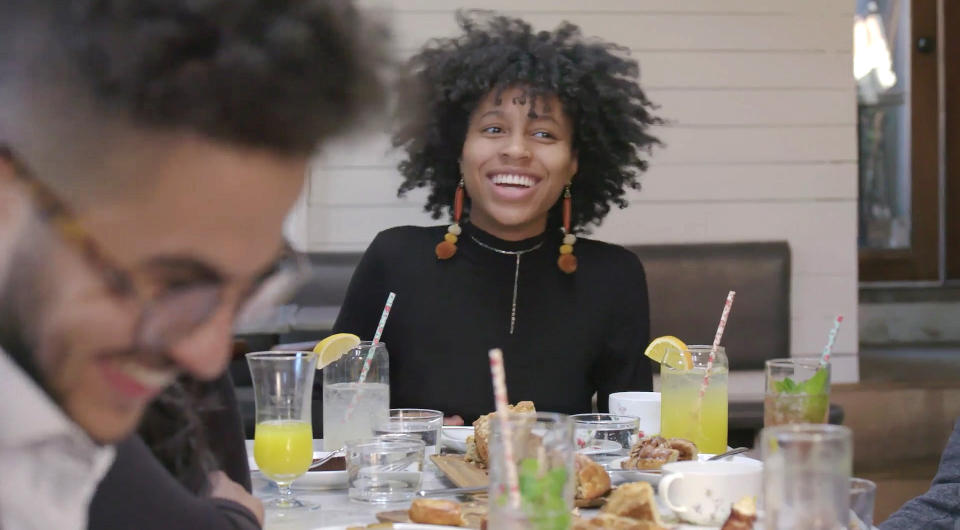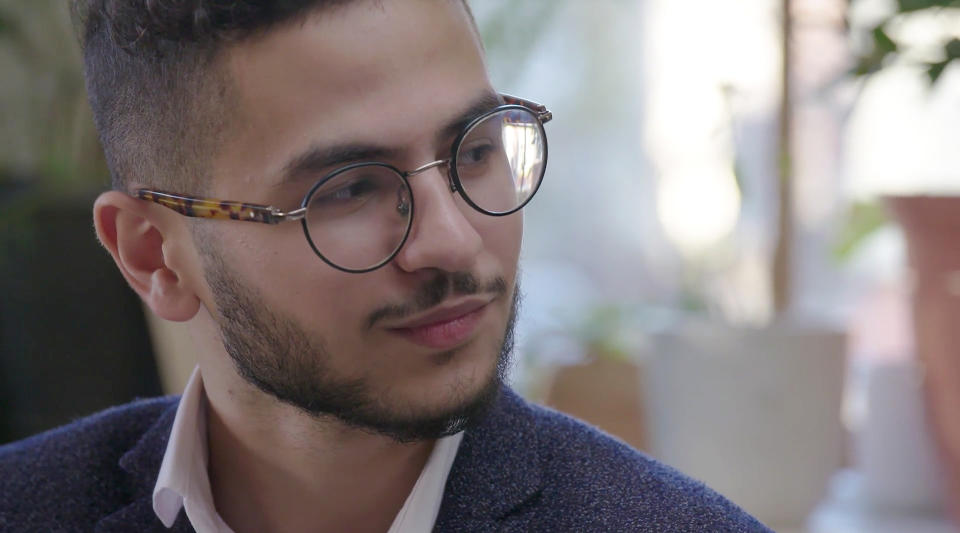Generation Z opens up about the refugee crisis
Seven strangers meet for brunch in Brooklyn. They have only two things in common: they were born roughy between 1998 and 2015, the cohort known as Generation Z, and they’re willing to talk politics at the dining table — specifically about refugees.
The group is surrounded by white stucco walls, marble tabletops and potted palms — an ideal setting for an Instagram photoshoot. But none of these Gen Z-ers have a phone in their hand. For the next few hours all devices are tucked away while the conversation proceeds without distraction, save for the cameras taping them.
UNICEF and Purpose, a creative agency specializing in purpose-driven campaigns that impact policy, have organized this group to discuss the global refugee crisis.
“If we brought folks — even folks who think very differently from one another — around a table, they could relax, eat something and bond over that,” says Gissou Nia, an international criminal lawyer and strategy director for Purpose. “The awkwardness of meeting a stranger gets stripped away.”
Members of Generation Z are known for choosing their own preferred pronouns, leading online-offline protests and backing intersectional politics. They’re a set of uniquely diverse, digital natives. And while they’re also considered the loneliest generation, they’re largely connected to the world via social media and can incite protests without leaving their bedrooms.
“The ultimate hope was to convene a group of change makers who would start to build solutions by them, for them because more than half of the world’s refugees are children,” says Nia. She helped bring together Gia Grier, 18, Ahmed Badr, 19, Abdalla Asem, 21, Soraya Morales Nuñez, 21, Fadumo Osman, 22, Latchmi Gopal, 24 and Julie Kim, 27.

Each of the video participants has a history of activism. They were selected via social media, and agreed to be filmed as a part of a campaign to welcome refugees to dinner. Among several issues discussed over brunch, displaced persons emerged as the most pressing topic.
“I didn’t feel like I knew enough about the refugee crisis to speak on it,” says Gia Grier, a high school graduate from Brooklyn, N.Y. “I think by having conversations that can sometimes be challenging or uncomfortable, because we don’t know too much about the topic at hand, we end up learning more about the world. I think challenging conversations are more rewarding.”
Grier is taking a gap year before attending college, deferring enrollment in a move similar, she points out, to actress Yara Shahidi and Malia Obama. So, when Purpose asked her to host the Generation Z conversation, she was available to take it on as a passion project.
“I was coordinating with all these people I had never met before,” says Grier, who, before the meeting, researched conversations about the refugee crisis on U.N. websites and in Teen Vogue, among others, and on aid and relief forums. “I challenged myself to learn more about the gravity of the issue.”
Grier says the experience showed her how “we are all connected in this world,” and exposed her to the work being done by others of her generation. “They do a really great job of raising consciousness about gun violence or what’s happening in Israel and Palestine,” says Grier. “They’re not afraid to share more information about that. I feel like I’m learning a lot through watching their stories or just interacting with their posts.”

Grier wasn’t alone in feeling intimidated by the table topic. The daughter of Somali refugees, Fadumo Osman says, “I had to remind myself that I care about this issue and learning never really stops. No one was going to judge me for not having saved thousands of people already.”
Osman, who has returned to San Jose, Calif., after graduating from NYU with a degree in computer science and politics, thinks Purpose found her through the Muslim ban hashtag. In college, she led NYU’s chapter of New York State College Democrats and was outspoken on human rights issues.
“Having to represent the liberal voice on campus but personally having much more radical views was interesting,” says Osman. “As a black Muslim woman, I can look at issues as a black person, as a Muslim, as someone whose parents are refugees. I knew what I believed in, I knew what I stood for. But I also had to understand that if I had the right to speak up and share my views, so did anyone else.”
Meeting with other Gen Z-ers was refreshing, says Osman. “Going to protests, I always meet people who are much older than me,” she says. “And even though I have a lot of friends on campus that cared about issues, it was almost always in setting of the classroom or a particular club — never over something like brunch.”
But what was most eye-opening to Osman was seeing the diversity of interests at the table. “Not everyone worked on refugee rights,” says Osman, “which made it cool to see their tactics on [issues] they care about. And to see that you can care about multiple issues at once. You don’t have to be a one-issue person.”
Ahmed Badr, a former Iraq refugee currently living in Houston, spoke about displacement from firsthand experience. A junior at Wesleyan University, he came to America with his family in 2008. Today, Badr is a U.S. citizen and says, “It’s really a privilege to be in this country. We had to really beat the odds to get here, and we have to keep this in perspective.”
Badr has traveled the world telling his refugee story, and now promotes youth storytelling as a means to self-empowerment.
“You can’t expect everyone to share their stories on an international stage,” says Badr. “But we need to have more representatives across different backgrounds. I can talk about my own experience and my background, but I can’t be the only person doing this. I don’t represent all of Gen Z.”
Like Osman, who has a close connection to the refugee crisis, Badr is familiar with being the only Gen Z-er around when speaking on global forums. “Usually I’m the youngest person in the room and closest person in age is typically in their mid-30s. On one hand, it’s a privilege to be a representative, but I can’t be the only person.”
Badr thinks that sometimes Gen Z doesn’t feel like they’re good enough to be a part of those spaces. “On one side is the systematic exclusion that happens,” says Badr, “and on the other there are people who don’t feel they are worthy of being in those spaces when in reality they are just as worthy as anyone else. You and your experience are valid enough.”

Despite being the only one at the table with lived refugee experience, Badr says, “There wasn’t anyone there who wanted to take up the whole space or take up the spotlight. Every single person around that table had different experiences, yet we could still find the common thread. We could still agree on something and disagree on [other] things. We had grown closer together by the end of [brunch].”
Badr hopes there will be more young people talking about the issue that brought him and six strangers together. “The refugee crisis isn’t going away any time soon, unfortunately,” says Badr. “In just a few years it’s going to be us making decisions. We’re already starting to change policy, or influence it at least.”
“We’re using whatever tools we have in our hands,” echoes Osman. “We’re finding different ways of making an impact. It may not look like the traditional ways of meeting in a community center, but it’s happening in digital spaces.”
Badr added: “The world is starting to realize we are definitely a part of the conversation and we deserve to be a part of the conversation because these are issues that are affecting us and our futures.”
The gathering ended but the participants have kept in touch, collaborating on social projects and sharing information about their separate interests. “I think we created a group of friends,” says Nia, who as strategy director played a part in the team effort to bring this group together.
Grier, as moderator, asked the group for ideas to solve the refugee crisis. Ultimately, they decided to host their own conversation, gathering strangers around a table, says Grier. She now hopes to travel to Africa and India once she’s in college.
“I think this concept of gathering people around a table can work in so many different ways,” says Grier. “The goal is to raise consciousness and make [the refugee crisis] more of a human issue, to give people a human entry point to a conversation that is often lost in jargon and statistics.”
_____
Read more from Yahoo News:
Lawyer suing Trump over emoluments expects to see hotel records
How journalists got it wrong about Missouri Gov. Eric Greitens
More young people plan to vote this year. But their key issues may surprise you.
Administration sharks circle Atlantic’s only national marine monument
Detroit’s mayor takes on gentrification as his city bounces back from bankruptcy



